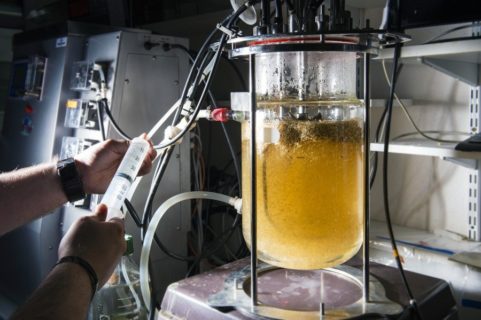En 2017, plusieurs agences nationales de financement (France, Allemagne, Finlande, Pologne, Suisse) ont décidé de préparer un appel pilote dans le domaine de la chimie solaire. L’appel a été lancé en décembre 2018 et 4 projets de recherche ont été financés par la France. A l’issue de ce succès, les agences ont décidé de lancer un nouvel appel à projet d’ici à la fin de l’année 2020. Il revient aux acteurs des pays participants de définir les priorités et les contours de cet appel et d’autre part d’identifier quels pays partenaires pourraient participer à l’appel en question.
Quelles priorités pour la France ?
In addition to the 2018 keywords (“artificial photosynthesis” or “artificial leaves”), which are direct conversion processes (i.e. photocatalysis and photoelectrocatalysis/photoelectrochemistry), we should emphasize that multi-step processes, e.g. involving photovoltaics, electrolysis and thermochemical processes (reductive catalysis, hydrogenation…) as well as biological and bio-hybrid approaches are fully in line with the call. We suggest adding in the call a figure adapted from that shown as Figure 1 of the Solar-driven Chemistry white paper (https://www.euchems.eu/wp-content/uploads/2016/09/160905-Solar-Driven-Chemistry-web.pdf):
Options for solar-driven chemical processes(reproduced from http://solarfuelsnetwork.com/solar-fuels) to be modified as follow: change photolysis for photo(bio)(electro)lysis and photochemical by photo(bio)(electro)chemical.
The open questions can be reformulated and completed as follows (modifications are italicized):
- Light harvesting and charge separation issues: Synthesis and design (including with numerical calculation tools) of new efficient and stable systems operating in the visible, photochemistry and photophysics)
- Fundamentals of enzymatic, molecular and inorganic catalysis: understand, design and benchmark selective, fast, energy-efficient, stable and O2/poison-tolerant catalysts
- Combined CO2 capture* and conversion (both from concentrated sources and air)
- Materials science and development (including high-throughput computing, ‘materials by design’ approaches, advanced characterization and in situ / operando measurements methodologies) to address performance, stability and scalability (namely limiting the use of critical elements)
- Benchmark of biological*, biohybrid, biomolecular and fully-synthetic solar-driven approaches.
- Engineering* of photo(bio)reactors and related multiscale-multiphysics approaches: experiments, modelling and material integration.
- New methods and software tools for early quantitative sustainability assessment: bridging energetic, environmental, economic and social impacts, analysis on whole life cycle (LCA).
- Heterogeneous photoelectrochemistry/photocatalysis (including surface-confined molecular systems)
- Photo(electro)catalytic water splitting and CO2 conversion
- Photocatalytic conversion of organic substrates using O2, H2O and CO2 without sacrificial electron donor/acceptor.
* These sub-topics were explicitly excluded from the 2018 Call. We believe that at least Engineering should be added.
As far as possible, the photocatalytic systems envisaged must take into account the available planet resources for the various metallic elements and the footprint generated. Particular attention should be paid to the energy balance of the system, that is to say the amount of energy necessary to convert a tonne of CO2 for example.Quels pays partenaires ?
Outre les premiers pays ayant participé à l’appel à projet 2018, il serait pertinent d’associer à l’appel 2020 les pays ci-après :
- Italie (forte communauté dans le domaine comme en témoigne le congrès EnerChem 2020 de Padoue)
- Espagne (expertise majeure en nanomatériaux
- Suède (Swedish Center for Artificial Photosynthesis)
- Grande-Bretagne (UK solar fuel Network)
- Danemark (strong expertise in electro and photoelectrocatalysis)
- Pays-Bas, Belgique (strong expertise in electro and photoelectrocatalysis)
Le Japon est également un pays pionnier de la photosynthèse artificielle et qui pourrait être intéressé à participer dans la continuité des calls ANR-JST

